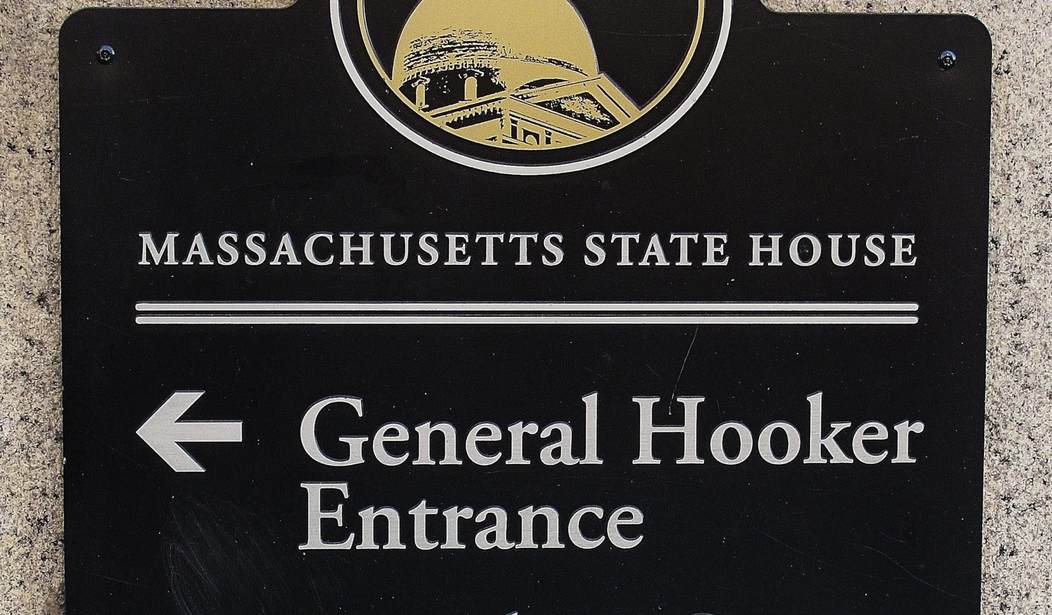A Democratic lawmaker in Massachusetts adopted the “Me Too” slogan, suggesting that a sign honoring a Civil War hero above the entrance to the Massachusetts State House constitutes an act of sexual harassment.
“R U a ‘General Hooker’? Of course not! Yet the main entrance of the Mass State House says otherwise. #MeToo,” state Rep. Michelle DuBois (D-Brockton) tweeted Wednesday. She suggested that the #MeToo movement is “not all about rape & harassment but also women’s dignity. A ‘funny’ double entendres misrepresented as respect for a long dead general?”
R U a “General Hooker”? Of course not! Yet the main entrance of the Mass State House says otherwise.#Metoo it’s not all about rape & harassment but also women’s dignity A “funny” double entendres misrepresented as respect for a long dead general?
1 Keep statue
2 Take sign down pic.twitter.com/3H67dRXAzN— Michelle DuBois (@RepDuBois) March 14, 2018
The #MeToo movement began on Twitter, where women who had suffered sexual harassment or assault at the hands of men identified themselves as victims. The movement brought to light many sexual abusers, most notoriously Harvey Weinstein and former Olympic doctor Larry Nassar. By claiming the movement for herself in this context, DuBois effectively accused a sign of sexual harassment.
If this weren’t clear enough, the lawmaker went on to tell the State House News Service, “Literally, the sign and the jokes about it both constitute what the House is voting on as discriminatory harassment.”
When a Twitter user suggested DuBois resign over the tweet, she responded, “No way.”
“Ive [sic] seen teenboys tease teengirls about being ‘general hookers’ waiting in line at the entrance,” the state rep. responded.
No way. Ive seen teenboys tease teengirls about being “general hookers” waiting in line at the entrance. Sign is out of context & either Gen’s his first name should be added or change the entrance name. This change is not a priority for me but I do think it should and will happen
— Michelle DuBois (@RepDuBois) March 14, 2018
The entrance takes its name from General Joseph Hooker (1814-1879), a Civil War Union general who reorganized the Army of the Potomac between January and May 1863. He won many victories, but lost to Robert E. Lee at the Battle of Chancellorsville. He resigned his generalship mere days before the more famous Battle of Gettysburg in 1863.
Daniel Chester French sculpted the statue between 1896 and 1903, when it was dedicated in front of the State House.
Contrary to popular myth, the term “hooker” to mean “prostitute” does not come from the general’s last name. This use for “hooker” traces back to 1845 at least, a full 16 years before the Civil War.
While the current version of the sign DuBois found so offensive dates from 2009, the entrance has been referred to as the “General Hooker entrance” at least since the 1990s, due to the fact that this entrance faces the statue of General Hooker, which dates back to 1903. Multiple entrances were open to the public before the September 11, 2001 attacks, but security measures have restricted public access to the General Hooker entrance.
“I think many people consider [General Hooker] to be part of the team that delivered freedom for the slaves in this country,” Massachusetts’ Republican Governor Charlie Baker said Thursday. “But the name over the building itself obviously carries with it a connotation that, if the legislature and others think is an appropriate thing to change, that’s certainly something we’d be willing to talk about.”
Others mocked DuBois’ suggestion — and especially the over-the-top manner of referring to a sign as a form of sexual harassment.
“There are all sorts of benign words in our language that sound like words unfit for polite company,” Jon Keller noted at CBS Boston. He referenced the planet Uranus as an example. Such words “offer us an opportunity to teach snickering kids about Civil War history or outer space—and about showing respect for others while avoiding making fools of ourselves.”
Reason‘s Elizabeth Nolan Brown also mocked DuBois for calling the sign an attack on “women’s dignity.” “If that isn’t the ultimate in futile, fainting-couch feminism, I’m not sure what is,” Brown quipped.
“Of course, DuBois is positioning herself as a crusader against sex-based harassment and patriarchy,” Brown admitted. “But attitudes like hers—which treat women as excessively fragile beings, and which posit that female ‘dignity’ is diminished by even so slight an association with sex work as walking under a door that says ‘hooker’—just props up old-fashioned and patriarchal ideas about sex and gender.”
Could DuBois’ stunt itself be considered an affront to women’s dignity?
On a side note, many public landmarks have truly bawdy names, which are not just the result of innuendo. The northern German city of Wismar has a street called “Tittentasterstrasse,” which roughly translates to “grab breasts street.” Since Wismar was a trade city, lonely sailors would wander the streets looking for a good time.

An unassuming road sign reads “Tittentasterstrasse,” a reference to the street of prostitutes, in Wismar, Germany (Photo Credit: Tyler O’Neil, PJ Media)
According to local legend, vandals often stole signs for this street, due to its bawdy name, so locals decided to paint the street name on the wall in lieu of having a sign at all. No word yet on whether German women feel sexually harassed by this historic sign.
Whatever the connotations of “General Hooker entrance,” at least this Massachusetts sign is actually a historical reference to a war hero.










Join the conversation as a VIP Member